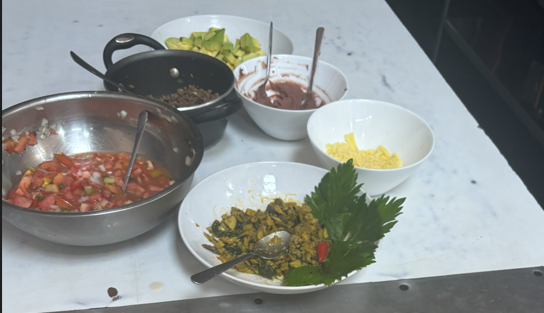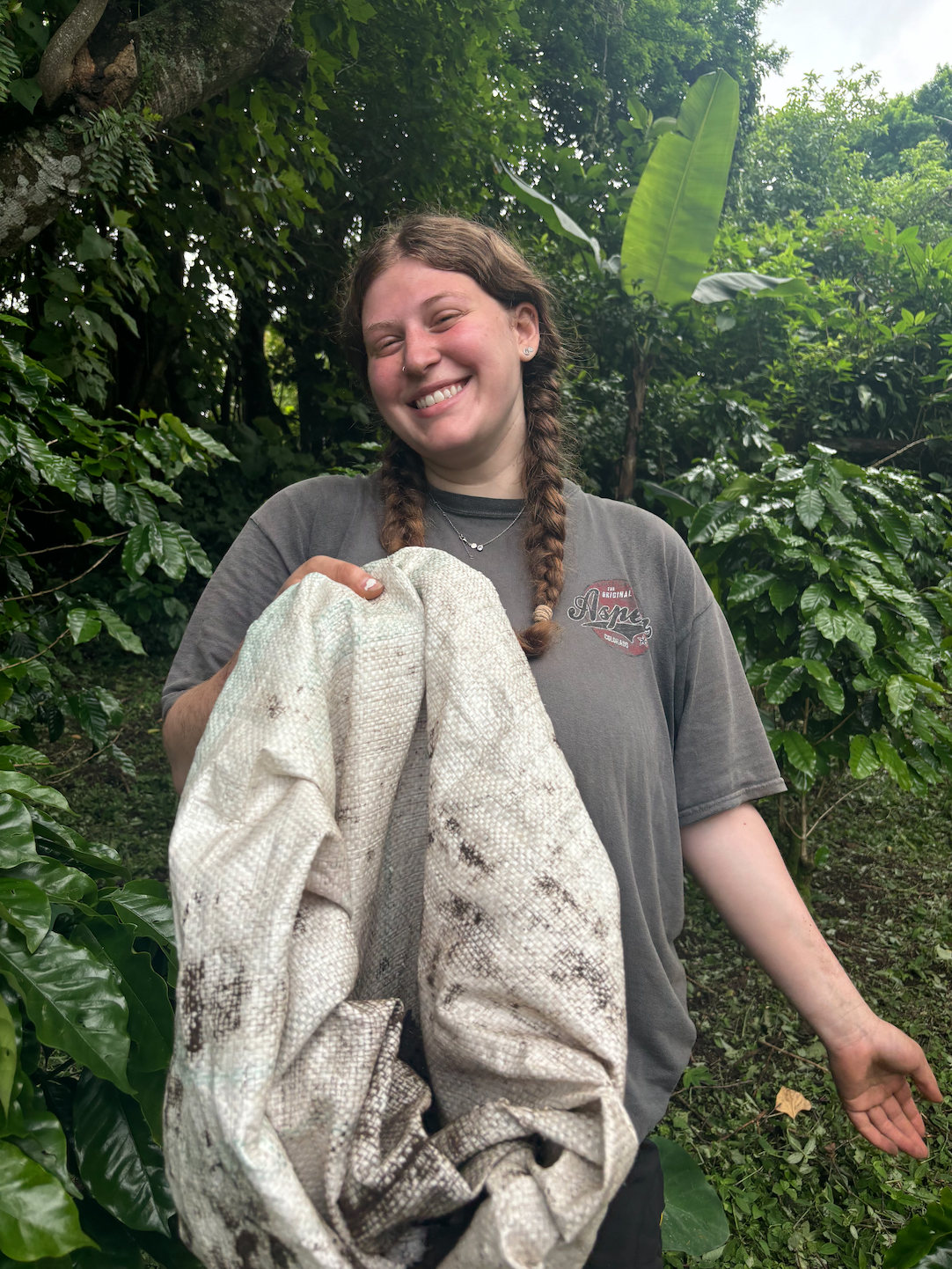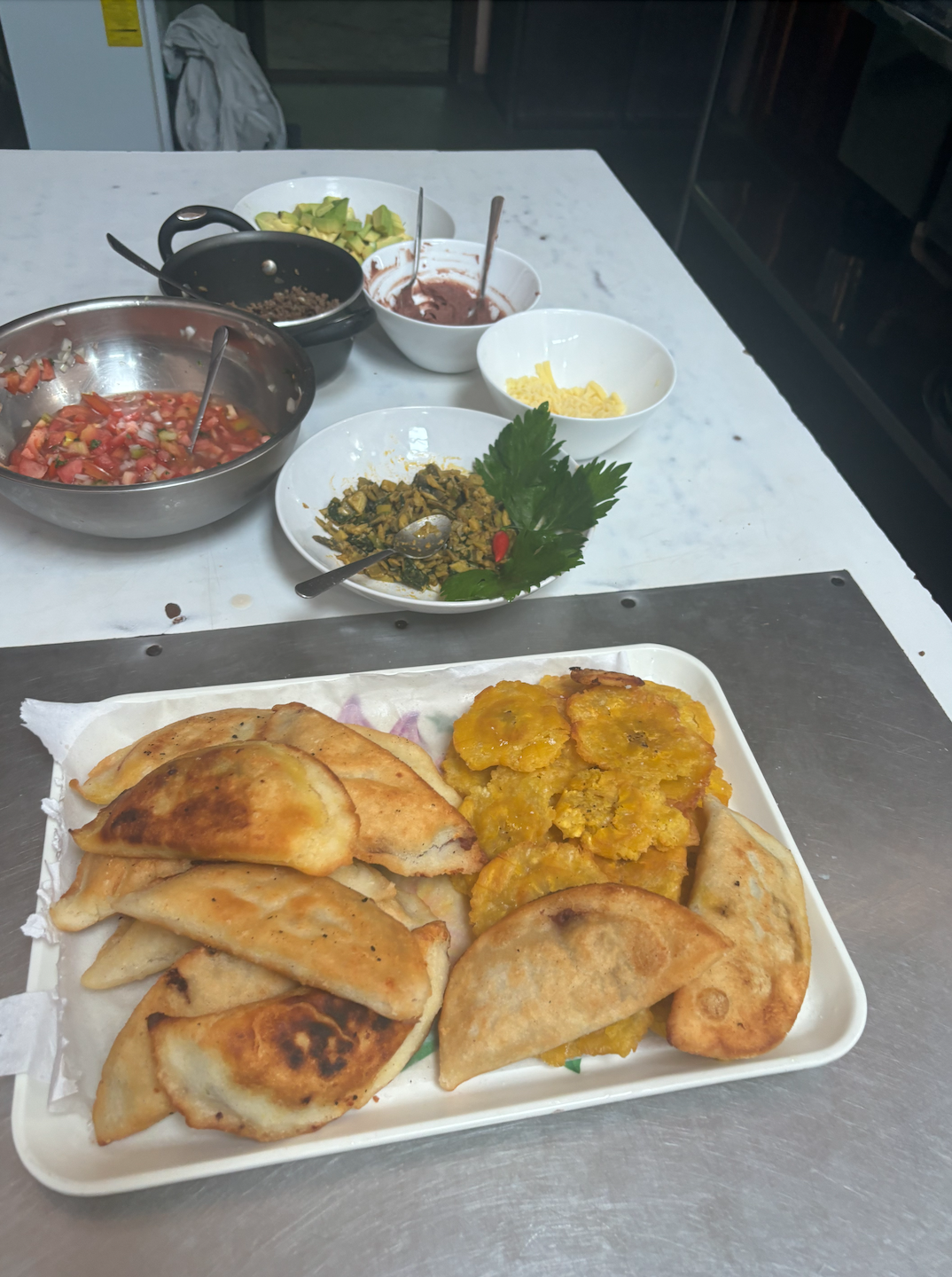A Week in the Life
By: Emily Roberts, CAS ’26

Cooking Class in Costa Rica
GRIP: Community Health and Environment in Monteverde, Costa Rica
My time in Costa Rica has been spent braving the daily torrential downpours, eating rice and beans, and frantically trying to think of the Spanish future tense verb endings so I can properly communicate with my homestay family.
 During my time working at the Monteverde Institute, I have been learning about permaculture and sustainability with the end goal of designing a productive greenhouse to increase the institute’s variety of crops grown on the premises to share with the community. To gain insight into sustainable farming practices and Costa Rican culture, I have visited and volunteered at several local farms to listen to the owners and observe their agricultural practices and Costa Rican culture to better inform my design process.
During my time working at the Monteverde Institute, I have been learning about permaculture and sustainability with the end goal of designing a productive greenhouse to increase the institute’s variety of crops grown on the premises to share with the community. To gain insight into sustainable farming practices and Costa Rican culture, I have visited and volunteered at several local farms to listen to the owners and observe their agricultural practices and Costa Rican culture to better inform my design process.
This week, I visited Lluvias de Gloria, a woman-owned farm located in Guanacaste, Costa Rica. On Monday, I was given a tour around the land with the owner, Doña Hermida. She plucked various fruits, including cas, passionfruit, water apples, and apple bananas, and insisted I taste and smell each and every one of them, and who am I to deny her?
On Tuesday and Wednesday, my severe lack of farming experience caused me to feel incredibly intimidated by the vast jungle before me while volunteering at Lluvias de Gloria. However, Doña Hermida and her grandson enthusiastically showed me the ropes, and the many dogs on the property helped to boost morale. I spent my time sweltering from the Costa Rica sun as Doña Hermida swung her machete to clear leaves and vines all over her 7 acres of land. Additionally, I learned how to properly place compost to be most effective, the importance of intercropping, and the value of growing organic crops compared to using pesticides. Doña Hermida also spoke extensively about how to combat erosion during the wet season and the lack of rain during the dry season. She also discussed being a woman in a male-dominated field. Upon leaving, I was handed a bag full of avocados, mangos, and soursop as a parting gift.
Back at the institute on Thursday, I learned how to prepare bags filled with dirt to be planted. With incredibly dirty fingers, I pack the dirt ensuring to keep the bottom of the bag rounded, administering as much pressure I can muster to make the bag compact and ready to be used for planting trees. With my new knowledge of dirt-packing, another intern and I packed around 50 bags that will eventually be used to enhance the forest around the Monteverde reserve.
On Friday, I participated in a sustainable cooking class at the institute. With my compost bucket in tow, I start with the pico de gallo. My eyes immediately water once I begin cutting the onion, but I must soldier through– I refuse to be bested by produce. I juice 4 limes, cut up some tomatoes, and add in freshly picked cilantro. I peel plantains, slice avocados, and prepare the dough for empanadas. The plantains become picadillo de plátanos and patacones, and the empanadas are stuffed with refried beans and cheese. Everything that has been fried in oil, is placed on a plate with a paper towel to cool. Once we are finished, we sit down to eat, and the rest of the staff shuffles in and out once the word spreads that the cooking class has come to its closure.
bucket in tow, I start with the pico de gallo. My eyes immediately water once I begin cutting the onion, but I must soldier through– I refuse to be bested by produce. I juice 4 limes, cut up some tomatoes, and add in freshly picked cilantro. I peel plantains, slice avocados, and prepare the dough for empanadas. The plantains become picadillo de plátanos and patacones, and the empanadas are stuffed with refried beans and cheese. Everything that has been fried in oil, is placed on a plate with a paper towel to cool. Once we are finished, we sit down to eat, and the rest of the staff shuffles in and out once the word spreads that the cooking class has come to its closure.
At the end of each day, I begin my 2.1-kilometer trek back to my homestay in Cerro Plano. On this lovely Friday at 5 PM CST, I gear up, putting on my rain jacket, and rain pants,and wrapping my computer and valuables in sweatshirts with a hope and prayer they will remain dry. I text my Mamá Tica that I will not need dinner tonight, as I have gorged myself on empanadas.
My first two weeks in Monteverde, Costa Rica have been exciting, informative, and incredibly fun. I have loved getting to know the staff at the institute, as well as learning about my homestay family. I am excited for the remainder of my time here, and am looking forward to learning more about sustainability, and hopefully gaining the ability to fluently speak in the future tense!
¡Hasta Luego!
Emily Roberts
The Global Research and Internship Program (GRIP) provides outstanding undergraduate and graduate students the opportunity to intern or conduct research abroad for 8 to 12 weeks over the summer. Participants gain career-enhancing experience and global exposure that is essential in a global workforce.